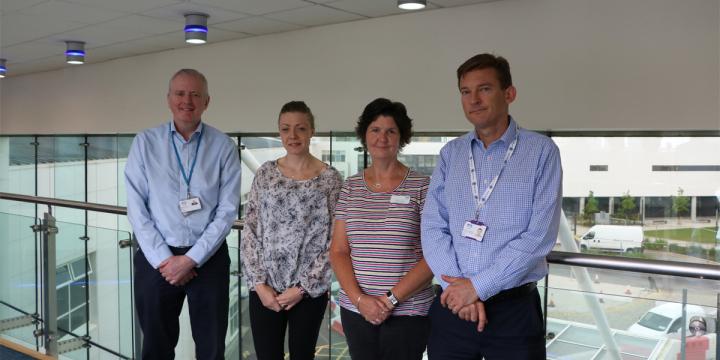SCARF Improves Community Outcomes and Reduces Early Unplanned Readmissions to Hospital.
SCARF - Supporting Community Recovery and Reducing Readmission Risk Following Critical Illness
The SCARF project team of Dr James Marple, Dr Eddie Donaghy, Jo Thompson and Julie Fenton has been based at the Royal Infirmary of Edinburgh since March 2018. The project has delivered very promising initial results in supporting community recovery and reducing unplanned hospital readmissions for an identified high-risk cohort of patients surviving a critical illness.
People who receive care in an intensive care unit (ICU) following a critical illness often leave hospital with complex health and social care needs. These specific needs make them more likely to experience an unplanned hospital readmission. There is a growing international recognition in the critical care community around the need to better support this particular cohort’s health and psycho-social care needs. This in turn will reduce their risk of early unplanned hospital readmission.
ICU survivors can experience significant clinical problems that affect them physically and psychologically. They may also face social issues such as employment problems, financial and family stresses. Consequently, many ICU survivors require significant support from community health and social care services. If the required support from health and social care services is not available or accessed quickly enough, their recovery can be negatively affected and they can be readmitted to hospital. Family members and carers of ICU survivors may also require support from health and social care services and third sector groups given the stressfulness of their own experience.
SCARF, a quality improvement project (funded by Healthcare Improvement Scotland) used an adaptive, iterative process, allowing the SCARF project team to make decisions in a responsive way as the project progressed. The project used a screening tool, newly developed through previous research conducted by the University of Edinburgh’s Critical Care Research Group (ECCRG), to identify those at highest risk of readmission. Those individuals identified as high risk of readmission went onto the SCARF pathway which involved rapid information transfer from hospital to GPs, health and social care partnership teams and community pharmacies.
The SCARF team built on previous research conducted by ECCRG which identified the importance of speaking to patients on acute hospital wards after leaving ICU but before discharge home and relaying key information on what to expect in terms of their health needs before they left hospital and returned home. A key feature of the project was establishing close links with community based teams within the health and social care partnerships across Lothian and third sector groups. This intense consultation work with multidisciplinary community health teams, GPs and pharmacists helped to deliver quicker and improved communication with patients’ key service providers. The key goal being rapid information transfer from hospital to community to enable key health and social care staff to anticipate the needs of these vulnerable complex patients prior to their discharge home. As part of the SCARF programme, patients were also contacted again by the project team 2 and 8 weeks after their discharge home.
Our initial result are very encouraging and we look forward to building on our work in the years ahead

The SCARF project team have presented their work at the International Conference of Integrated Care, San Sebastian, Spain in April 2019 and at the Scottish Intensive Care Society (SICS) Conference. The team will also present at the British Association of Critical Care Nurses conference in Edinburgh, September 2019.

